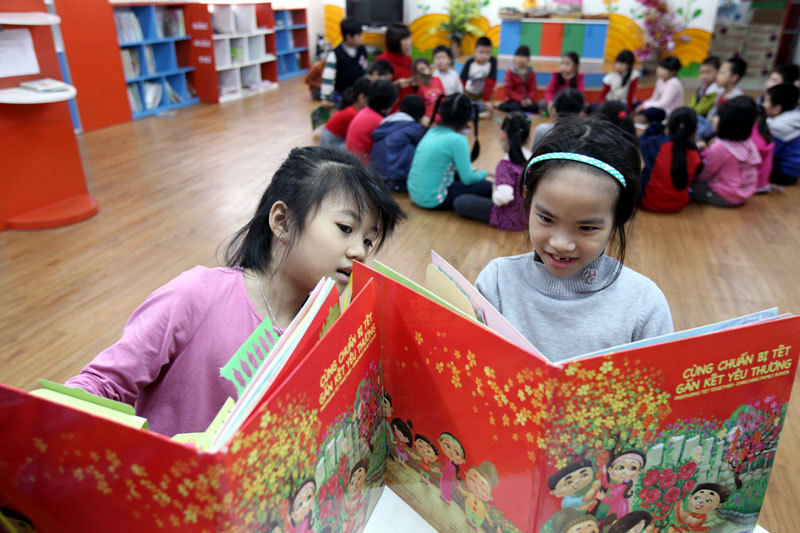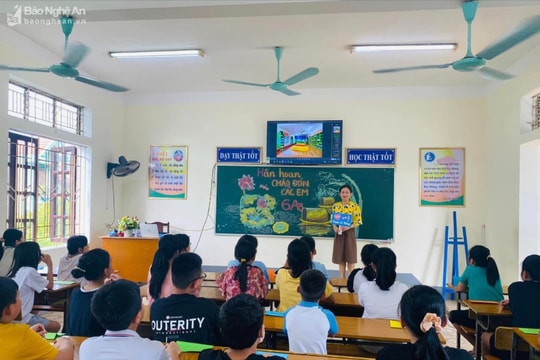Education reforms do not need trillion-dollar projects
From 1945 to present, Vietnam has undergone 4 major reforms (1950, 1956, 1979, 2013).
In each reform, there are major changes such as the national school system, curriculum content - textbooks, teaching methods, assessment methods, etc.
However, when looking closely at the movements involved in these educational reforms, it seems that school life has been neglected in the reforms.
 |
| Creating a healthy school life is important in every educational reform. Photo: Le Anh Dung |
Usually, in major educational reforms around the world, school life including all activities taking place in school and the atmosphere surrounding it are always included in the reform content and its improvement is an important sign in considering the success of the reform.
However, school life in Vietnam today, despite having undergone many reforms, is still in the old way and has not changed significantly.
School activities and the atmosphere there are still heavily influenced by the mindset, habits and lifestyle of decades ago in the context of a country at war and not yet deeply integrated into the world community.
There are many such school activities: weekend class activities, student conduct assessment, "Red Flag" (red star) team activities...
These activities are heavily influenced by the mindset of disciplining students and when carried out repeatedly on a national scale in all schools over a long period of time, they become…normal school activities.
However, in today's era of globalization, when viewed under the modern educational philosophy aimed at shaping citizens, many of these activities are seen as abnormal and harmful to student development and school operations.
Take a typical example of evaluating students' conduct (morality).
A school is an organization, a space with its own characteristics, so it always needs "rules" that members living in that space must comply with to ensure that its activities are not disrupted.
However, violating school "rules" such as being late, talking privately, forgetting to be on duty, forgetting to do homework... cannot be the basis for evaluating a person's morality. Academic achievement measured by grades is even less the basis for determining whether someone has good or bad morality.
Furthermore, unilateral moral judgment of students by teachers, an entity that holds both “power” and “authority” in its hands, will create a mechanism of unconditional obedience that is harmful to the formation of students' thinking and personality.
A person's morality cannot be evaluated as good/bad with levels of fair, good, poor, average, weak... as simply as school teachers are doing. It is both offensive and easily creates harm in students, who are in the process of socialization to become adults.
It is easy to see that in reality, many students who were often subjected to poor conduct during their school years have become people with rich souls and respectable personalities, while many students who had good conduct for 12 consecutive years have become selfish, self-serving people who are willing to trample on the health, lives, and living space of others.
In Japan and perhaps in all other countries with successful education systems, there is no moral assessment of students in schools.
To improve the quality of education and reduce problems in schools, improving school activities is inevitable. Therefore, in addition to considering eliminating student conduct assessments, schools also need to eliminate the following activities:
1. Use students as "Red Stars" to find other students' mistakes and score each other in competition.
2. Ranking students in class and by grade.
3. Commenting publicly about students in front of other parents or other students during group activities such as flag salutes or class activities, parent meetings.
4. Use "supervisors" to check and monitor students' compliance with school rules (the title "supervisor" in schools can evoke negative associations that are not appropriate for an educational environment)
Along with eliminating the old school activities mentioned above, schools need to actively do the following:
1. Create conditions for students to organize "autonomous" clubs and organizations such as sports, arts, cultural, and social activity clubs.
2. Create conditions for students to produce and operate school radio and publish periodic class and school magazines.
3. Create conditions and support for students to conduct activities in conjunction with parents, local people and society such as: performing arts, exhibitions displaying learning products, annual or semester-based sports festivals.
4. Create opportunities for parents to participate in school activities with students such as visiting, observing class hours, sports competitions, cultural exchanges, participating in volunteer activities in local communities and in school with their children, building school gardens, laboratories...
In modern educational theory, school is not only a place to prepare for life but must be life itself for students to experience and practice being "young citizens" when actively participating in the role of "master" in social activities.
Therefore, the richer and more realistic school life is, the more favorable it will be for students' growth.
These reforms do not require "thousands of billions of dong" and can be done at any school regardless of its physical conditions.
Any educational reform must eventually be tested in practice. If the reform cannot create a fresh and democratic atmosphere and freedom in schools, no matter how elaborate the reform policies and strategies are, they will hardly succeed.
According to Vietnamnet.vn
| RELATED NEWS |
|---|

.jpg)




